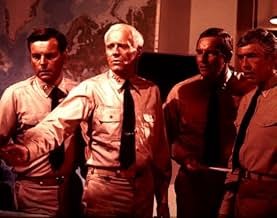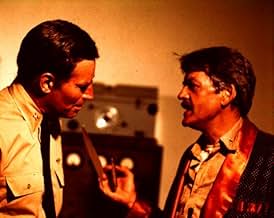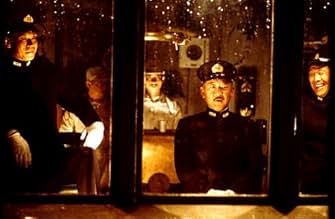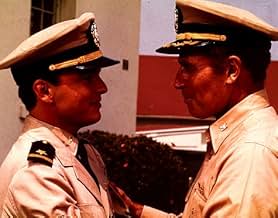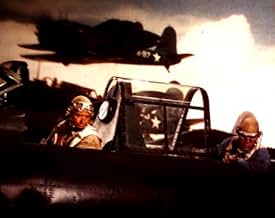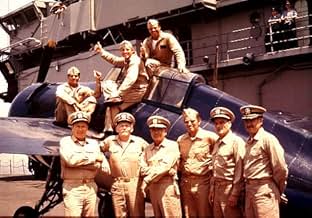IMDb-BEWERTUNG
6,8/10
22.549
IHRE BEWERTUNG
Die Schlacht um Midway im Pazifik gilt gemeinhin Wendepunkt des Zweiten Weltkriegs.Die Schlacht um Midway im Pazifik gilt gemeinhin Wendepunkt des Zweiten Weltkriegs.Die Schlacht um Midway im Pazifik gilt gemeinhin Wendepunkt des Zweiten Weltkriegs.
Toshirô Mifune
- Admiral Isoroku Yamamoto
- (as Toshiro Mifune)
Empfohlene Bewertungen
I remember reading that this movie was made primarily because they had excessive footage from when they shot "Tora! Tora! Tora! and some of the shot looks like they did came from that film. But this film also includes old actual shots taken by service men and news people.
The movie is based on the American victory off Midway Island. The movie was made 30 years after WWII and a couple of years after Vietnam, so it doesn't have a jingoistic feel to it. It has more of a matter of fact feel to it, more a docudrama than propaganda.
The movie is different from most war movies because it shows how Grand battles are won and lost. There isn't much individual heroism from ordinary soldiers shown. Instead we see how commanders, in this case admirals make decisions and take risks usually based on sketchy information. They put their reputations on line, along with the safety of their men, and the security of their nations. We see how the outcome of a battle can hinged on risky decisions or sometimes on indecision. We see how commanders have to sweat out their decisions as History hangs on the balance. Yes! History! This battle after all is considered the turning point of the War in the Pacific.
In this movie decisions are made on what certain letters mean, whether enemy carriers are where they are supposed to be. If viewers give it the appropriate attention, they will see that this movie plays like a giant chess match. The outcome determined by gutsy moves and bad decisions, sometimes indecision.
The movie boasts an impressive cast which include, Henry Fonda, Glenn Ford, Robert Mitchum, Cliff Robertson, Charlton Heston and they all do fine jobs. They play the typical Grand characters in epic movies, they move the story along but has no personal stories themselves. The one personal story belongs to Edward Albert, who plays Heston's son. He's not very convincing and playing opposite a pro like Mr. Heston, he comes across as being weak almost amateurish.
The movie is good but far from great. I love how the filmmakers remained true to the events. But the special effects looked cheap and the use of actual combat footage feels inappropriate and even exploitive. Nevertheless I think it's a good film not to be missed by Military History buffs.
The movie is based on the American victory off Midway Island. The movie was made 30 years after WWII and a couple of years after Vietnam, so it doesn't have a jingoistic feel to it. It has more of a matter of fact feel to it, more a docudrama than propaganda.
The movie is different from most war movies because it shows how Grand battles are won and lost. There isn't much individual heroism from ordinary soldiers shown. Instead we see how commanders, in this case admirals make decisions and take risks usually based on sketchy information. They put their reputations on line, along with the safety of their men, and the security of their nations. We see how the outcome of a battle can hinged on risky decisions or sometimes on indecision. We see how commanders have to sweat out their decisions as History hangs on the balance. Yes! History! This battle after all is considered the turning point of the War in the Pacific.
In this movie decisions are made on what certain letters mean, whether enemy carriers are where they are supposed to be. If viewers give it the appropriate attention, they will see that this movie plays like a giant chess match. The outcome determined by gutsy moves and bad decisions, sometimes indecision.
The movie boasts an impressive cast which include, Henry Fonda, Glenn Ford, Robert Mitchum, Cliff Robertson, Charlton Heston and they all do fine jobs. They play the typical Grand characters in epic movies, they move the story along but has no personal stories themselves. The one personal story belongs to Edward Albert, who plays Heston's son. He's not very convincing and playing opposite a pro like Mr. Heston, he comes across as being weak almost amateurish.
The movie is good but far from great. I love how the filmmakers remained true to the events. But the special effects looked cheap and the use of actual combat footage feels inappropriate and even exploitive. Nevertheless I think it's a good film not to be missed by Military History buffs.
A critical part of WWII gets the big epic cinematic treatment, with all star casting and lots of noise. Though purporting to be exactly how things were during this particular battle, a pinch of salt is also needed. Much of the film is taken up with laying foundations for the air-sea engagement of the title, political posturing and military machinations are joined by needless sub-plots. The dialogue is often cheese laden, some characterisations equally so, while the splicing of real life footage and other war movie moments start to detract. However, the last third of film is thrilling and worth waiting for, a whirl of battle action as the Pacific conflict comes vividly to life both visually and aurally. 6.5/10
Like "The Longest Day" and "Tora! Tora! Tora!", "Midway" follows the true story very closely and features an all star cast. And like the Longest Day, it features Henry Fonda, Robert Mitchum, and Robert Wagner. However, whereas the first two are war classics, Midway falls short in many departments.
For one, the movie seems to have no sense of building suspense. In the Longest Day, the paratrooper landings and the scenes of bombardment vessels creeping toward the shore let you know that all hell is about to break loose. Likewise, in Tora! Tora! Tora!, scenes of anxious commanders, desperate analysts, and the oblivious Hawaii residents are separated by scenes of approaching Japanese bombers to hike the suspense factor. Yet, despite the fact that Midway was the most decisive naval battle in modern history, we don't get a true sense of how important the pilots' jobs are or how grave the implications of the battle are, except for from titles before and after the movie. Where were the scenes of planes prepping for takeoff or of pilots, wary but dutiful about a mission that may be their last?
The battle sequences are another problem. First off, most of the footage is actual war footage or stock footage. The stock footage works fine for the bombing of Tokyo (since the shown footage is actually about that event) but is a little less convincing when the footage shown is supposed to be of Hawaii's Hickam Field but is passed off as Midway Island. Worse than the presence of stock footage is the editing. While maps of the ocean are shown repeatedly so that we know where the action is taking place, it's hard to tell what's what when we're away from the maps. We see planes crash into water and bombs explode, but most of the battle sequences could use a little more coherence. Had the makers of this movie shot a little combat footage of their own, even if only to make the battle scenes less jump, the movie would have benefitted.
For the most part, the cast is pretty good and fares well with only occasionally trite dialogue. However, only Heston, Holbrook, and Shigeta stand out. Many of the other players are simply not given enough time to make an impact. Coburn, especially, has little to do.
The flaws of this movie notwithstanding, it's still watchable, and it gives you a pretty good idea of the events and decisions leading up to the battle, as well as the errors and luck that went into the battle itself. And when you can't figure out what's happened from the uneven visuals, at least Nimitz (Fonda) or his at-sea commanders are there to describe what happened and add some perspective.
** out of ****
For one, the movie seems to have no sense of building suspense. In the Longest Day, the paratrooper landings and the scenes of bombardment vessels creeping toward the shore let you know that all hell is about to break loose. Likewise, in Tora! Tora! Tora!, scenes of anxious commanders, desperate analysts, and the oblivious Hawaii residents are separated by scenes of approaching Japanese bombers to hike the suspense factor. Yet, despite the fact that Midway was the most decisive naval battle in modern history, we don't get a true sense of how important the pilots' jobs are or how grave the implications of the battle are, except for from titles before and after the movie. Where were the scenes of planes prepping for takeoff or of pilots, wary but dutiful about a mission that may be their last?
The battle sequences are another problem. First off, most of the footage is actual war footage or stock footage. The stock footage works fine for the bombing of Tokyo (since the shown footage is actually about that event) but is a little less convincing when the footage shown is supposed to be of Hawaii's Hickam Field but is passed off as Midway Island. Worse than the presence of stock footage is the editing. While maps of the ocean are shown repeatedly so that we know where the action is taking place, it's hard to tell what's what when we're away from the maps. We see planes crash into water and bombs explode, but most of the battle sequences could use a little more coherence. Had the makers of this movie shot a little combat footage of their own, even if only to make the battle scenes less jump, the movie would have benefitted.
For the most part, the cast is pretty good and fares well with only occasionally trite dialogue. However, only Heston, Holbrook, and Shigeta stand out. Many of the other players are simply not given enough time to make an impact. Coburn, especially, has little to do.
The flaws of this movie notwithstanding, it's still watchable, and it gives you a pretty good idea of the events and decisions leading up to the battle, as well as the errors and luck that went into the battle itself. And when you can't figure out what's happened from the uneven visuals, at least Nimitz (Fonda) or his at-sea commanders are there to describe what happened and add some perspective.
** out of ****
I can't help but agree with most of the other comments: the sloppy production values, the scenes "borrowed" from better movies, the countless anachronisms, the distracting subplot about Lt. Garth and his Japanese girlfriend, and so on. But for me, this movie has two strong points in its favor. One, when they get around to the actual battle, they follow the history with surprising accuracy. (The "Pearl Harbor" makers could have learned something from this one.) So the movie's hard to follow? So was the actual battle! Personally, I think they did a pretty good job of keeping the flow coherent while still remaining faithful to its source material.
The second thing in its favor is that, from the moment I first saw it in the theater as a 10 year old, it ignited in me a passion for the Battle of Midway that remains to this day. I can't think of any other movie that even comes close to getting me as hooked on its subject as this one. Maybe it's a good thing I first saw it when I was young, when I was much less discerning about production values, etc. That way, I could concentrate on the story itself.
If you have even the slightest interest in military history or even in important historical events in general, do yourself a favor. Watch "Midway" to get an overview of the event (fast-forward over the love-story scenes if you like), then go read "Incredible Victory" by Walter Lord (which is a better book than the one for which he is most famous, "A Night to Remember"). You won't be sorry.
The second thing in its favor is that, from the moment I first saw it in the theater as a 10 year old, it ignited in me a passion for the Battle of Midway that remains to this day. I can't think of any other movie that even comes close to getting me as hooked on its subject as this one. Maybe it's a good thing I first saw it when I was young, when I was much less discerning about production values, etc. That way, I could concentrate on the story itself.
If you have even the slightest interest in military history or even in important historical events in general, do yourself a favor. Watch "Midway" to get an overview of the event (fast-forward over the love-story scenes if you like), then go read "Incredible Victory" by Walter Lord (which is a better book than the one for which he is most famous, "A Night to Remember"). You won't be sorry.
The film Midway shows in graphic documentary style, the battle that did nothing less than save America and ultimately allow us to win World War II. If the Japanese had prevailed at Midway, they might very well have taken Hawaii and been blockading our continental Pacific coast. We might have had to declare a truce and hope that public opinion would allow us to continue the European and North African war. Remember the USA was brought in to the war because of the Japanese attack at Pearl Harbor, not Hitler's attack.
There is a plot of sorts with Charlton Heston as the fictional pilot group commander who's involved in helping his son Edward Albert help a Nisei family who've been interred for the duration of the war because Albert is engaged to the daughter. That's the one weakness of Midway, the story really wasn't necessary and detracted with the very precise telling of the Midway tale. Had they left it out, Midway had the potential to be a classic like The Longest Day.
Without Charlton Heston and his family problems, the story of Midway is told with remarkable historic accuracy. Henry Fonda who played Admiral Chester W. Nimitz in all but name in In Harm's Way, gets to play Nimitz again in Midway. Robert Mitchum and Glenn Ford play Admirals William Halsey and Raymond Spruance who between the two of them won America's Pacific war. A whole lot of fine character actors like James Coburn, Robert Wagner, Robert Webber, Hal Holbrook and many more fill their naval roles to precision.
The story of the Battle of Midway should be told and told again in America's public schools for future generations. Not just because of the sailors and airmen of America's greatest generation who fought and prevailed at Midway, but because of just how close a run thing the Battle of Midway was. One very fateful decision by Admirals Yamamoto and Nagumo turned the tide of battle on a dime. By the way the oriental players in Midway like Toshiro Mifune as Yamamoto and James Shigeta as Nagumo and others also play very well. The American cinema certainly came a long way from when they previously cast the Japanese as bucktooth primates.
When the viewer sees just how much pure luck played a part in winning at Midway, they will come away with one of two impressions. The first might be that a divine providence is guiding and protecting America. If so, who's to say that will always be the case. And if not, the second lesson might be that we as a country might not always be so lucky.
If they could edit out the Heston family story, Midway is a great film for history classes studying World War II.
There is a plot of sorts with Charlton Heston as the fictional pilot group commander who's involved in helping his son Edward Albert help a Nisei family who've been interred for the duration of the war because Albert is engaged to the daughter. That's the one weakness of Midway, the story really wasn't necessary and detracted with the very precise telling of the Midway tale. Had they left it out, Midway had the potential to be a classic like The Longest Day.
Without Charlton Heston and his family problems, the story of Midway is told with remarkable historic accuracy. Henry Fonda who played Admiral Chester W. Nimitz in all but name in In Harm's Way, gets to play Nimitz again in Midway. Robert Mitchum and Glenn Ford play Admirals William Halsey and Raymond Spruance who between the two of them won America's Pacific war. A whole lot of fine character actors like James Coburn, Robert Wagner, Robert Webber, Hal Holbrook and many more fill their naval roles to precision.
The story of the Battle of Midway should be told and told again in America's public schools for future generations. Not just because of the sailors and airmen of America's greatest generation who fought and prevailed at Midway, but because of just how close a run thing the Battle of Midway was. One very fateful decision by Admirals Yamamoto and Nagumo turned the tide of battle on a dime. By the way the oriental players in Midway like Toshiro Mifune as Yamamoto and James Shigeta as Nagumo and others also play very well. The American cinema certainly came a long way from when they previously cast the Japanese as bucktooth primates.
When the viewer sees just how much pure luck played a part in winning at Midway, they will come away with one of two impressions. The first might be that a divine providence is guiding and protecting America. If so, who's to say that will always be the case. And if not, the second lesson might be that we as a country might not always be so lucky.
If they could edit out the Heston family story, Midway is a great film for history classes studying World War II.
Wusstest du schon
- WissenswertesKevin Dobson's character Ensign George Gay, was the sole survivor of Torpedo Squadron 8. Gay wrote a book about his experiences (Sole Survivor) and was an advisor on this film.
- PatzerWhen the cockpit of one of the planes catches fire, the pilot pulls out a fire extinguisher. It is a more modern one, not a fire extinguisher that would have existed in the 1940s.
- Zitate
Vice Adm. Chuichi Nagumo: [commenting on the American torpedo bombers] They sacrifice themselves like samurai, these Americans.
- Alternative VersionenA television version exists, with additional cast and plot. It runs four hours with commercials. The main plot points are a Charlton Heston-Susan Sullivan romance and the Coral Sea battle (referred to in the other version) is played out like the Midway battle. The Coral Sea battle heavily features Mitchell Ryan as Admiral Aubrey Fitch and also includes a subplot where a young Japanese pilot who'd met with Admiral Nagumo to express his opposition to Japanese military action is shot down. At the end of the TV version, Sullivan and Christine Kukobo are both shown waiting dockside.
- VerbindungenEdited from Salute to the Marines (1943)
- SoundtracksIn the Mood
Music by Joe Garland
Performed by the Glenn Miller and His Orchestra (as Glenn Miller Orchestra) on the jukebox at the bar in Hawaii
Top-Auswahl
Melde dich zum Bewerten an und greife auf die Watchlist für personalisierte Empfehlungen zu.
- How long is Midway?Powered by Alexa
Details
Box Office
- Bruttoertrag in den USA und Kanada
- 43.220.000 $
- Eröffnungswochenende in den USA und in Kanada
- 4.356.666 $
- 20. Juni 1976
- Laufzeit2 Stunden 12 Minuten
- Farbe
- Seitenverhältnis
- 2.39 : 1
Zu dieser Seite beitragen
Bearbeitung vorschlagen oder fehlenden Inhalt hinzufügen

Oberste Lücke
By what name was Schlacht um Midway (1976) officially released in India in English?
Antwort

